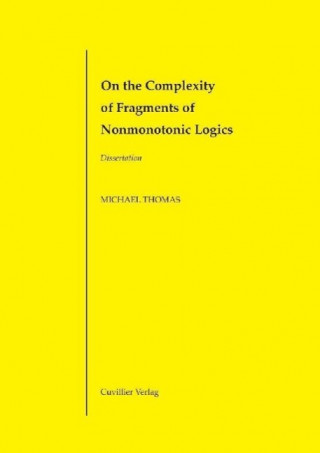
Code: 13414649
On the Complexity of Fragments of Nonmonotonic Logics
by Michael Thomas
Nonmonotonic reasoning is one of the most important tasks in the area of knowledge representation and reasoning. Several logics have been developed to formalize nonmonotonic reasoning. In this thesis we consider three well-known l ... more
- Language:
 English
English - Binding: Paperback
- ISBN-13: 9783869555713
Publisher: Cuvillier Verlag, 2010
- More about this

You might also like
-

Dune
34.84 zł -33 % -

Haunting Adeline
125.81 zł -1 % -

Berserk Deluxe Volume 2
212.65 zł -1 % -

White Nights
15.40 zł -23 % -

Powerless
48.75 zł -11 % -

Atomic Habits
59.22 zł -26 % -

Dune Messiah
46.33 zł -3 % -

Berserk Deluxe Volume 3
218.19 zł -3 % -

One Day
32.63 zł -36 % -

Berserk Deluxe Volume 1
211.84 zł -2 % -

Iron Flame
61.14 zł -28 % -

Surrounded by Idiots
36.76 zł -28 % -

Harry Potter and the Prisoner of Azkaban (Minalima Edition)
170.44 zł -2 % -

Gravity Falls Journal 3
89.45 zł -

Heaven Official's Blessing: Tian Guan Ci Fu (Novel) Vol. 1
88.94 zł -1 % -

The Creative Act
100.22 zł -15 % -

Dune
47.34 zł -23 % -

Hunting Adeline
126.52 zł -4 % -

A Little Life
47.04 zł -14 % -

Children of Dune
46.73 zł -2 % -

Heaven Official's Blessing: Tian Guan Ci Fu (Novel) Vol. 2
77.76 zł -14 %
Availability alert
Enter your e-mail address and once book will be available,
we will send you a message. It's that simple.
More about On the Complexity of Fragments of Nonmonotonic Logics
 Book synopsis
Book synopsis
Nonmonotonic reasoning is one of the most important tasks in the area of knowledge representation and reasoning. Several logics have been developed to formalize nonmonotonic reasoning. In this thesis we consider three well-known logics that facilitate nonmonotonic reasoning by different means: default logic, autoepistemic logic and circumscription. We study the computational complexity of consistency, reasoning and counting problems for fragments of these logics obtained by restricting the available Boolean connectives, as well as the possibility to translate between these fragments. For this we generalize the logics to allow for arbitrary connectives rather than the Boolean standard base and study the complexity of the problems and possibility of translations for all finite sets of allowed Boolean connectives.Our results show that in all cases the complexity of the problems does not depend on the particular set B of available connectives but on the set of functions expressible by projections and arbitrary compositions from B. We obtain polytomous complexity classifications (that is, into a finite number of complexity degrees) for all decision problems studied herein ranging from completeness for classes in the second level of the polynomial hierarchy down to membership in AC0. Furthermore, the counting problems are with one interesting exception shown to be trichotomous with complexity degrees spanning the first three levels of the counting hierarchy. To the best of our knowledge, the counting complexity of default logic is addressed here for the first time. Finally, we consider translations between fragments of these logics that leave the set of propositional consequences of the input invariant. We show which fragments of default logic, autoepistemic logic and circumscription can, under the chosen notion of translations, be embedded into fragments of the other two logics. We complete this picture by showing that in almost all cases in which no translation is given, no translation preserving the set of propositional consequences may exist unless the polynomial hierarchy collapses.
 Book details
Book details
- Full title: On the Complexity of Fragments of Nonmonotonic Logics
- Author: Michael Thomas
- Language:
 English
English - Binding: Paperback
- EAN: 9783869555713
- ISBN: 3869555718
- ID: 13414649
- Publisher: Cuvillier Verlag
- Weight: 198 g
- Dimensions: 208 × 146 × 12 mm
- Date of publishing: 29. November 2010
safisfied customers
Since 2008, we have served long line of book lovers, but each of them was always on the first place.
Copyright! ©2008-24 libristo.pl All rights reservedPrivacyPoučení o cookies



 21 million books
21 million books Delivery 12.99 zł
Delivery 12.99 zł (32) 444 93 66 (8-15.30h)
(32) 444 93 66 (8-15.30h)